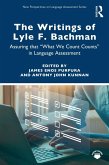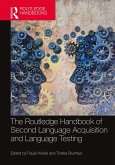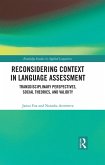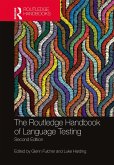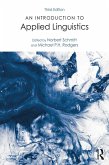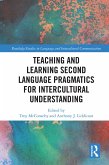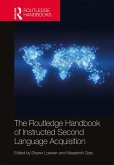The Writings of Lyle F. Bachman (eBook, ePUB)
Assuring that "What We Count Counts" in Language Assessment
Redaktion: Purpura, James Enos; Kunnan, Antony John
49,95 €
49,95 €
inkl. MwSt.
Sofort per Download lieferbar

25 °P sammeln
49,95 €
Als Download kaufen

49,95 €
inkl. MwSt.
Sofort per Download lieferbar

25 °P sammeln
Jetzt verschenken
Alle Infos zum eBook verschenken
49,95 €
inkl. MwSt.
Sofort per Download lieferbar
Alle Infos zum eBook verschenken

25 °P sammeln
The Writings of Lyle F. Bachman (eBook, ePUB)
Assuring that "What We Count Counts" in Language Assessment
Redaktion: Purpura, James Enos; Kunnan, Antony John
- Format: ePub
- Merkliste
- Auf die Merkliste
- Bewerten Bewerten
- Teilen
- Produkt teilen
- Produkterinnerung
- Produkterinnerung

Bitte loggen Sie sich zunächst in Ihr Kundenkonto ein oder registrieren Sie sich bei
bücher.de, um das eBook-Abo tolino select nutzen zu können.
Hier können Sie sich einloggen
Hier können Sie sich einloggen
Sie sind bereits eingeloggt. Klicken Sie auf 2. tolino select Abo, um fortzufahren.

Bitte loggen Sie sich zunächst in Ihr Kundenkonto ein oder registrieren Sie sich bei bücher.de, um das eBook-Abo tolino select nutzen zu können.
Lyle F. Bachman has produced a high volume of scholarly articles and books in the field of language assessment. These writings have strongly influenced the discipline and over the last three decades have played an uncontested role in shaping the field. This is the first book to assemble Bachman's work into a single volume.
- Geräte: eReader
- mit Kopierschutz
- eBook Hilfe
Andere Kunden interessierten sich auch für
![The Writings of Lyle F. Bachman (eBook, PDF) The Writings of Lyle F. Bachman (eBook, PDF)]() The Writings of Lyle F. Bachman (eBook, PDF)49,95 €
The Writings of Lyle F. Bachman (eBook, PDF)49,95 €![The Routledge Handbook of Second Language Acquisition and Language Testing (eBook, ePUB) The Routledge Handbook of Second Language Acquisition and Language Testing (eBook, ePUB)]() The Routledge Handbook of Second Language Acquisition and Language Testing (eBook, ePUB)46,95 €
The Routledge Handbook of Second Language Acquisition and Language Testing (eBook, ePUB)46,95 €![Reconsidering Context in Language Assessment (eBook, ePUB) Reconsidering Context in Language Assessment (eBook, ePUB)]() Janna FoxReconsidering Context in Language Assessment (eBook, ePUB)41,95 €
Janna FoxReconsidering Context in Language Assessment (eBook, ePUB)41,95 €![The Routledge Handbook of Language Testing (eBook, ePUB) The Routledge Handbook of Language Testing (eBook, ePUB)]() The Routledge Handbook of Language Testing (eBook, ePUB)46,95 €
The Routledge Handbook of Language Testing (eBook, ePUB)46,95 €![An Introduction to Applied Linguistics (eBook, ePUB) An Introduction to Applied Linguistics (eBook, ePUB)]() An Introduction to Applied Linguistics (eBook, ePUB)42,95 €
An Introduction to Applied Linguistics (eBook, ePUB)42,95 €![Teaching and Learning Second Language Pragmatics for Intercultural Understanding (eBook, ePUB) Teaching and Learning Second Language Pragmatics for Intercultural Understanding (eBook, ePUB)]() Teaching and Learning Second Language Pragmatics for Intercultural Understanding (eBook, ePUB)41,95 €
Teaching and Learning Second Language Pragmatics for Intercultural Understanding (eBook, ePUB)41,95 €![The Routledge Handbook of Instructed Second Language Acquisition (eBook, ePUB) The Routledge Handbook of Instructed Second Language Acquisition (eBook, ePUB)]() The Routledge Handbook of Instructed Second Language Acquisition (eBook, ePUB)51,95 €
The Routledge Handbook of Instructed Second Language Acquisition (eBook, ePUB)51,95 €-
-
-
Lyle F. Bachman has produced a high volume of scholarly articles and books in the field of language assessment. These writings have strongly influenced the discipline and over the last three decades have played an uncontested role in shaping the field. This is the first book to assemble Bachman's work into a single volume.
Dieser Download kann aus rechtlichen Gründen nur mit Rechnungsadresse in A, B, BG, CY, CZ, D, DK, EW, E, FIN, F, GR, HR, H, IRL, I, LT, L, LR, M, NL, PL, P, R, S, SLO, SK ausgeliefert werden.
Produktdetails
- Produktdetails
- Verlag: Taylor & Francis eBooks
- Seitenzahl: 496
- Erscheinungstermin: 31. Juli 2024
- Englisch
- ISBN-13: 9781317656616
- Artikelnr.: 72247324
- Verlag: Taylor & Francis eBooks
- Seitenzahl: 496
- Erscheinungstermin: 31. Juli 2024
- Englisch
- ISBN-13: 9781317656616
- Artikelnr.: 72247324
- Herstellerkennzeichnung Die Herstellerinformationen sind derzeit nicht verfügbar.
James Enos Purpura is Professor Emeritus of linguistics and education in the Applied Linguistics and TESOL Program and Director of the Scenario-Based Language Assessment Lab at Teachers College, Columbia University, USA. His scholarly interests include: the assessment of grammar, meaning, and pragmatics; cognition and language assessment; and both learning-oriented and scenario-based assessment. He was editor of Language Assessment Quarterly and past president of the International Language Testing Association. Antony John Kunnan is a language assessment specialist with Carnegie Mellon University, USA, as a Senior Research Fellow. His research interests are fairness of tests and testing practice, assessment literacy, research methods and statistics, ethics and standards, and language assessment policy. He was founding editor of Language Assessment Quarterly, past president of the International Language Testing Association, and the founding president of the Asian Association for Language Assessment. He was awarded the Cambridge/ILTA Distinguished Achievement Award in language assessment in 2024.
Support Material: Further Readings from Lyle F. Bachman
Series Editors' Preface
The L. F. Bachman Collection Project
by James Enos Purpura
Acknowledgments
Permissions
Introduction
Introducing L. F. Bachman's Milieu
by James Enos Purpura & Antony John Kunnan
Section 1: About L. F. Bachman
Article 1.1
Language Assessment: Its Development and Future-An interview with Lyle F. Bachman
by Jing Chen (2011)
Article 1.2
A biographical sketch of Lyle Bachman
by Antony John Kunnan (2013)
Section 2: Validation: Theory and Practice
Article 2.1
The construct validation of some components of communicative proficiency (with Adrian S. Palmer) (1982)
Article 2.2
A comparison of the abilities measured by the Cambridge and Educational Testing Service EFL test batteries (with Fred Davidson and John Foulkes) (1990)
Article 2.3
Constructing an assessment use argument and supporting claims about test taker-assessment interactions in evidence-centered assessment design (2003)
Article 2.4
Building and supporting a case for test use (2005)
Article 2.5
How is educational measurement supposed to deal with test use? (2013)
Article 2.6
A new approach to classroom-based language assessment (with Barbara E. Damböck) (2022)
Article 2.7 (Online)
Bachman, L. F. (1982). The trait structure of cloze test scores. TESOL Quarterly, 16, 61-70.
Article 2.8 (Online)
Anderson, N., Bachman, L. F., Perkins, K., & Cohen, A. (1991). An exploratory study into the construct validity of a reading comprehension test Triangulation of data sources. Language Testing, 8, 41-66.
Article 2.9 (Online)
Bachman, L. F. (2016, unpublished). Assessment justification: An alternative to validation for evaluating and assuring assessment quality
Section 3: Defining What Language Tests Measure: L2 Proficiency and Performance
Article 3.1
An examination of some language tests from a communicative viewpoint (1985)
Article 3.2
Some reflections on task-based language performance assessment (2002)
Article 3.3
Alternative interpretations of alternative assessments: Some validity issues in educational performance assessments (2002)
Article 3.4
What is the construct? The dialectic of abilities and contexts in defining constructs in language assessment (2007)
Article 3.5 (Online)
Bachman, L. F., & Sauvignon, S. J. (1986). The evaluation of communicative language proficiency: A critique of the ACTFL oral interview. The Modern Language Journal, 70, 380-390.
Article 3.6 (Online)
Bachman, L. F. (1988). Problems in examining the validity of the ACTFL oral proficiency interview. Studies in Second Language Acquisition, 10, 149-164.
Article 3.7 (Online)
Bachman, L. F. (1990). Constructing measures and measuring constructs. In B. Harley, P. Allen, J. Cummins, & M. Swain (Eds.), The Development of Second Language Proficiency (pp. 26-38). Cambridge: Cambridge University Press.
Section 4: Test Task Characteristics
Article 4.1
Performance on cloze tests with fixed-ratio and rational deletions (1985)
Article 4.2
The use of test method characteristics in the content analysis and design of EFL proficiency tests (with Fred Davidson and Michael Milanovic) (1996)
Article 4.3 (Online)
Bachman, L., F., Lynch, B., & Mason, M. (1995). Investigating variability in tasks and rater judgments in a performance test of foreign language speaking. Language Testing, 12, 238-257.
Article 4.4 (Online)
Bachman, L. F., & Palmer, A. S. (1981). The construct validation of the FSI oral interview. Language Learning, 31, 67-86.
Article 4.5 (Online)
Bachman, L. F. (1981). An experiment in a picture-stimuli procedure for testing oral production. In A. S. Palmer et al. (Eds.), The construct validation of tests of communicative competence (pp. 140-148). Washington, D. C. TESOL.
Article 4.6 (Online)
Bachman, L. F., Kunnan, A. Vanniarajan, S., & Lynch, B. (1988). Task and ability analysis as a basis of examining the content and construct comparability of two EFL proficiency test batteries. Language Testing, 5, 128-159.
Section 5: Language Testing-Second Language Acquisition
Article 5.1
Language Testing-SLA research interfaces (1988)
Article 5.2 (Online)
Bachman, L. F. (1988). Language Testing-SLA interfaces: An update. In L. F. Bachman & A. Cohen (Eds.), Interfaces between SLA and Language Testing Research (pp. 1-31). New York: Cambridge University Press.
Section 6: Epistemological Issues in Applied Linguistics Research
Article 6.1
Generalizability: A journey into the nature of empirical research in applied linguistics (2006)
Article 6.2 (Online)
Bachman, L. F. (2009). Generalizability and Research Use Arguments. In Erickan, K. & Roth, W-M. (Eds.) Generalizing from Educational Research: Beyond qualitative and quantitative polarization. (pp. 127-148) New York: Routledge.
Section 7: State of the Art and Reflections
Article 7.1
What does language testing have to offer? (1991)
Article 7.2
Modern language testing at the turn of the century: Assuring that what we count counts (2000)
Article 7.3
Ongoing challenges [in Language Assessment] (2014)
Article 7.4 (Online)
Bachman, L. F., & Purpura, J. E. (2008). Language Assessments: Gate-Keepers or Door Openers? In B. M. Spolsky, & F. M. Hult, (Eds.), The Handbook of Educational Linguistics (pp. 456-468) Boston: Wiley-Blackwell.
List of Bachman's Publications
Author and Subject Index
Series Editors' Preface
The L. F. Bachman Collection Project
by James Enos Purpura
Acknowledgments
Permissions
Introduction
Introducing L. F. Bachman's Milieu
by James Enos Purpura & Antony John Kunnan
Section 1: About L. F. Bachman
Article 1.1
Language Assessment: Its Development and Future-An interview with Lyle F. Bachman
by Jing Chen (2011)
Article 1.2
A biographical sketch of Lyle Bachman
by Antony John Kunnan (2013)
Section 2: Validation: Theory and Practice
Article 2.1
The construct validation of some components of communicative proficiency (with Adrian S. Palmer) (1982)
Article 2.2
A comparison of the abilities measured by the Cambridge and Educational Testing Service EFL test batteries (with Fred Davidson and John Foulkes) (1990)
Article 2.3
Constructing an assessment use argument and supporting claims about test taker-assessment interactions in evidence-centered assessment design (2003)
Article 2.4
Building and supporting a case for test use (2005)
Article 2.5
How is educational measurement supposed to deal with test use? (2013)
Article 2.6
A new approach to classroom-based language assessment (with Barbara E. Damböck) (2022)
Article 2.7 (Online)
Bachman, L. F. (1982). The trait structure of cloze test scores. TESOL Quarterly, 16, 61-70.
Article 2.8 (Online)
Anderson, N., Bachman, L. F., Perkins, K., & Cohen, A. (1991). An exploratory study into the construct validity of a reading comprehension test Triangulation of data sources. Language Testing, 8, 41-66.
Article 2.9 (Online)
Bachman, L. F. (2016, unpublished). Assessment justification: An alternative to validation for evaluating and assuring assessment quality
Section 3: Defining What Language Tests Measure: L2 Proficiency and Performance
Article 3.1
An examination of some language tests from a communicative viewpoint (1985)
Article 3.2
Some reflections on task-based language performance assessment (2002)
Article 3.3
Alternative interpretations of alternative assessments: Some validity issues in educational performance assessments (2002)
Article 3.4
What is the construct? The dialectic of abilities and contexts in defining constructs in language assessment (2007)
Article 3.5 (Online)
Bachman, L. F., & Sauvignon, S. J. (1986). The evaluation of communicative language proficiency: A critique of the ACTFL oral interview. The Modern Language Journal, 70, 380-390.
Article 3.6 (Online)
Bachman, L. F. (1988). Problems in examining the validity of the ACTFL oral proficiency interview. Studies in Second Language Acquisition, 10, 149-164.
Article 3.7 (Online)
Bachman, L. F. (1990). Constructing measures and measuring constructs. In B. Harley, P. Allen, J. Cummins, & M. Swain (Eds.), The Development of Second Language Proficiency (pp. 26-38). Cambridge: Cambridge University Press.
Section 4: Test Task Characteristics
Article 4.1
Performance on cloze tests with fixed-ratio and rational deletions (1985)
Article 4.2
The use of test method characteristics in the content analysis and design of EFL proficiency tests (with Fred Davidson and Michael Milanovic) (1996)
Article 4.3 (Online)
Bachman, L., F., Lynch, B., & Mason, M. (1995). Investigating variability in tasks and rater judgments in a performance test of foreign language speaking. Language Testing, 12, 238-257.
Article 4.4 (Online)
Bachman, L. F., & Palmer, A. S. (1981). The construct validation of the FSI oral interview. Language Learning, 31, 67-86.
Article 4.5 (Online)
Bachman, L. F. (1981). An experiment in a picture-stimuli procedure for testing oral production. In A. S. Palmer et al. (Eds.), The construct validation of tests of communicative competence (pp. 140-148). Washington, D. C. TESOL.
Article 4.6 (Online)
Bachman, L. F., Kunnan, A. Vanniarajan, S., & Lynch, B. (1988). Task and ability analysis as a basis of examining the content and construct comparability of two EFL proficiency test batteries. Language Testing, 5, 128-159.
Section 5: Language Testing-Second Language Acquisition
Article 5.1
Language Testing-SLA research interfaces (1988)
Article 5.2 (Online)
Bachman, L. F. (1988). Language Testing-SLA interfaces: An update. In L. F. Bachman & A. Cohen (Eds.), Interfaces between SLA and Language Testing Research (pp. 1-31). New York: Cambridge University Press.
Section 6: Epistemological Issues in Applied Linguistics Research
Article 6.1
Generalizability: A journey into the nature of empirical research in applied linguistics (2006)
Article 6.2 (Online)
Bachman, L. F. (2009). Generalizability and Research Use Arguments. In Erickan, K. & Roth, W-M. (Eds.) Generalizing from Educational Research: Beyond qualitative and quantitative polarization. (pp. 127-148) New York: Routledge.
Section 7: State of the Art and Reflections
Article 7.1
What does language testing have to offer? (1991)
Article 7.2
Modern language testing at the turn of the century: Assuring that what we count counts (2000)
Article 7.3
Ongoing challenges [in Language Assessment] (2014)
Article 7.4 (Online)
Bachman, L. F., & Purpura, J. E. (2008). Language Assessments: Gate-Keepers or Door Openers? In B. M. Spolsky, & F. M. Hult, (Eds.), The Handbook of Educational Linguistics (pp. 456-468) Boston: Wiley-Blackwell.
List of Bachman's Publications
Author and Subject Index
Support Material: Further Readings from Lyle F. Bachman
Series Editors' Preface
The L. F. Bachman Collection Project
by James Enos Purpura
Acknowledgments
Permissions
Introduction
Introducing L. F. Bachman's Milieu
by James Enos Purpura & Antony John Kunnan
Section 1: About L. F. Bachman
Article 1.1
Language Assessment: Its Development and Future-An interview with Lyle F. Bachman
by Jing Chen (2011)
Article 1.2
A biographical sketch of Lyle Bachman
by Antony John Kunnan (2013)
Section 2: Validation: Theory and Practice
Article 2.1
The construct validation of some components of communicative proficiency (with Adrian S. Palmer) (1982)
Article 2.2
A comparison of the abilities measured by the Cambridge and Educational Testing Service EFL test batteries (with Fred Davidson and John Foulkes) (1990)
Article 2.3
Constructing an assessment use argument and supporting claims about test taker-assessment interactions in evidence-centered assessment design (2003)
Article 2.4
Building and supporting a case for test use (2005)
Article 2.5
How is educational measurement supposed to deal with test use? (2013)
Article 2.6
A new approach to classroom-based language assessment (with Barbara E. Damböck) (2022)
Article 2.7 (Online)
Bachman, L. F. (1982). The trait structure of cloze test scores. TESOL Quarterly, 16, 61-70.
Article 2.8 (Online)
Anderson, N., Bachman, L. F., Perkins, K., & Cohen, A. (1991). An exploratory study into the construct validity of a reading comprehension test Triangulation of data sources. Language Testing, 8, 41-66.
Article 2.9 (Online)
Bachman, L. F. (2016, unpublished). Assessment justification: An alternative to validation for evaluating and assuring assessment quality
Section 3: Defining What Language Tests Measure: L2 Proficiency and Performance
Article 3.1
An examination of some language tests from a communicative viewpoint (1985)
Article 3.2
Some reflections on task-based language performance assessment (2002)
Article 3.3
Alternative interpretations of alternative assessments: Some validity issues in educational performance assessments (2002)
Article 3.4
What is the construct? The dialectic of abilities and contexts in defining constructs in language assessment (2007)
Article 3.5 (Online)
Bachman, L. F., & Sauvignon, S. J. (1986). The evaluation of communicative language proficiency: A critique of the ACTFL oral interview. The Modern Language Journal, 70, 380-390.
Article 3.6 (Online)
Bachman, L. F. (1988). Problems in examining the validity of the ACTFL oral proficiency interview. Studies in Second Language Acquisition, 10, 149-164.
Article 3.7 (Online)
Bachman, L. F. (1990). Constructing measures and measuring constructs. In B. Harley, P. Allen, J. Cummins, & M. Swain (Eds.), The Development of Second Language Proficiency (pp. 26-38). Cambridge: Cambridge University Press.
Section 4: Test Task Characteristics
Article 4.1
Performance on cloze tests with fixed-ratio and rational deletions (1985)
Article 4.2
The use of test method characteristics in the content analysis and design of EFL proficiency tests (with Fred Davidson and Michael Milanovic) (1996)
Article 4.3 (Online)
Bachman, L., F., Lynch, B., & Mason, M. (1995). Investigating variability in tasks and rater judgments in a performance test of foreign language speaking. Language Testing, 12, 238-257.
Article 4.4 (Online)
Bachman, L. F., & Palmer, A. S. (1981). The construct validation of the FSI oral interview. Language Learning, 31, 67-86.
Article 4.5 (Online)
Bachman, L. F. (1981). An experiment in a picture-stimuli procedure for testing oral production. In A. S. Palmer et al. (Eds.), The construct validation of tests of communicative competence (pp. 140-148). Washington, D. C. TESOL.
Article 4.6 (Online)
Bachman, L. F., Kunnan, A. Vanniarajan, S., & Lynch, B. (1988). Task and ability analysis as a basis of examining the content and construct comparability of two EFL proficiency test batteries. Language Testing, 5, 128-159.
Section 5: Language Testing-Second Language Acquisition
Article 5.1
Language Testing-SLA research interfaces (1988)
Article 5.2 (Online)
Bachman, L. F. (1988). Language Testing-SLA interfaces: An update. In L. F. Bachman & A. Cohen (Eds.), Interfaces between SLA and Language Testing Research (pp. 1-31). New York: Cambridge University Press.
Section 6: Epistemological Issues in Applied Linguistics Research
Article 6.1
Generalizability: A journey into the nature of empirical research in applied linguistics (2006)
Article 6.2 (Online)
Bachman, L. F. (2009). Generalizability and Research Use Arguments. In Erickan, K. & Roth, W-M. (Eds.) Generalizing from Educational Research: Beyond qualitative and quantitative polarization. (pp. 127-148) New York: Routledge.
Section 7: State of the Art and Reflections
Article 7.1
What does language testing have to offer? (1991)
Article 7.2
Modern language testing at the turn of the century: Assuring that what we count counts (2000)
Article 7.3
Ongoing challenges [in Language Assessment] (2014)
Article 7.4 (Online)
Bachman, L. F., & Purpura, J. E. (2008). Language Assessments: Gate-Keepers or Door Openers? In B. M. Spolsky, & F. M. Hult, (Eds.), The Handbook of Educational Linguistics (pp. 456-468) Boston: Wiley-Blackwell.
List of Bachman's Publications
Author and Subject Index
Series Editors' Preface
The L. F. Bachman Collection Project
by James Enos Purpura
Acknowledgments
Permissions
Introduction
Introducing L. F. Bachman's Milieu
by James Enos Purpura & Antony John Kunnan
Section 1: About L. F. Bachman
Article 1.1
Language Assessment: Its Development and Future-An interview with Lyle F. Bachman
by Jing Chen (2011)
Article 1.2
A biographical sketch of Lyle Bachman
by Antony John Kunnan (2013)
Section 2: Validation: Theory and Practice
Article 2.1
The construct validation of some components of communicative proficiency (with Adrian S. Palmer) (1982)
Article 2.2
A comparison of the abilities measured by the Cambridge and Educational Testing Service EFL test batteries (with Fred Davidson and John Foulkes) (1990)
Article 2.3
Constructing an assessment use argument and supporting claims about test taker-assessment interactions in evidence-centered assessment design (2003)
Article 2.4
Building and supporting a case for test use (2005)
Article 2.5
How is educational measurement supposed to deal with test use? (2013)
Article 2.6
A new approach to classroom-based language assessment (with Barbara E. Damböck) (2022)
Article 2.7 (Online)
Bachman, L. F. (1982). The trait structure of cloze test scores. TESOL Quarterly, 16, 61-70.
Article 2.8 (Online)
Anderson, N., Bachman, L. F., Perkins, K., & Cohen, A. (1991). An exploratory study into the construct validity of a reading comprehension test Triangulation of data sources. Language Testing, 8, 41-66.
Article 2.9 (Online)
Bachman, L. F. (2016, unpublished). Assessment justification: An alternative to validation for evaluating and assuring assessment quality
Section 3: Defining What Language Tests Measure: L2 Proficiency and Performance
Article 3.1
An examination of some language tests from a communicative viewpoint (1985)
Article 3.2
Some reflections on task-based language performance assessment (2002)
Article 3.3
Alternative interpretations of alternative assessments: Some validity issues in educational performance assessments (2002)
Article 3.4
What is the construct? The dialectic of abilities and contexts in defining constructs in language assessment (2007)
Article 3.5 (Online)
Bachman, L. F., & Sauvignon, S. J. (1986). The evaluation of communicative language proficiency: A critique of the ACTFL oral interview. The Modern Language Journal, 70, 380-390.
Article 3.6 (Online)
Bachman, L. F. (1988). Problems in examining the validity of the ACTFL oral proficiency interview. Studies in Second Language Acquisition, 10, 149-164.
Article 3.7 (Online)
Bachman, L. F. (1990). Constructing measures and measuring constructs. In B. Harley, P. Allen, J. Cummins, & M. Swain (Eds.), The Development of Second Language Proficiency (pp. 26-38). Cambridge: Cambridge University Press.
Section 4: Test Task Characteristics
Article 4.1
Performance on cloze tests with fixed-ratio and rational deletions (1985)
Article 4.2
The use of test method characteristics in the content analysis and design of EFL proficiency tests (with Fred Davidson and Michael Milanovic) (1996)
Article 4.3 (Online)
Bachman, L., F., Lynch, B., & Mason, M. (1995). Investigating variability in tasks and rater judgments in a performance test of foreign language speaking. Language Testing, 12, 238-257.
Article 4.4 (Online)
Bachman, L. F., & Palmer, A. S. (1981). The construct validation of the FSI oral interview. Language Learning, 31, 67-86.
Article 4.5 (Online)
Bachman, L. F. (1981). An experiment in a picture-stimuli procedure for testing oral production. In A. S. Palmer et al. (Eds.), The construct validation of tests of communicative competence (pp. 140-148). Washington, D. C. TESOL.
Article 4.6 (Online)
Bachman, L. F., Kunnan, A. Vanniarajan, S., & Lynch, B. (1988). Task and ability analysis as a basis of examining the content and construct comparability of two EFL proficiency test batteries. Language Testing, 5, 128-159.
Section 5: Language Testing-Second Language Acquisition
Article 5.1
Language Testing-SLA research interfaces (1988)
Article 5.2 (Online)
Bachman, L. F. (1988). Language Testing-SLA interfaces: An update. In L. F. Bachman & A. Cohen (Eds.), Interfaces between SLA and Language Testing Research (pp. 1-31). New York: Cambridge University Press.
Section 6: Epistemological Issues in Applied Linguistics Research
Article 6.1
Generalizability: A journey into the nature of empirical research in applied linguistics (2006)
Article 6.2 (Online)
Bachman, L. F. (2009). Generalizability and Research Use Arguments. In Erickan, K. & Roth, W-M. (Eds.) Generalizing from Educational Research: Beyond qualitative and quantitative polarization. (pp. 127-148) New York: Routledge.
Section 7: State of the Art and Reflections
Article 7.1
What does language testing have to offer? (1991)
Article 7.2
Modern language testing at the turn of the century: Assuring that what we count counts (2000)
Article 7.3
Ongoing challenges [in Language Assessment] (2014)
Article 7.4 (Online)
Bachman, L. F., & Purpura, J. E. (2008). Language Assessments: Gate-Keepers or Door Openers? In B. M. Spolsky, & F. M. Hult, (Eds.), The Handbook of Educational Linguistics (pp. 456-468) Boston: Wiley-Blackwell.
List of Bachman's Publications
Author and Subject Index

